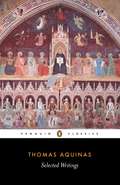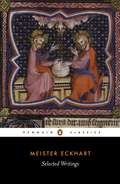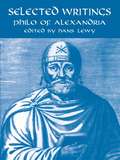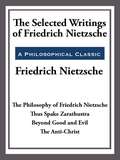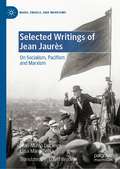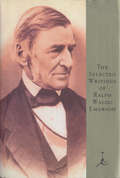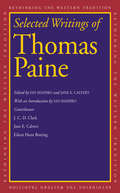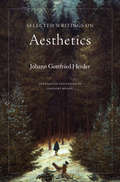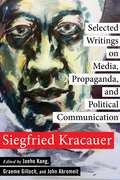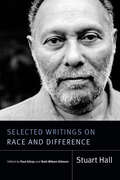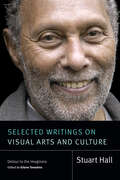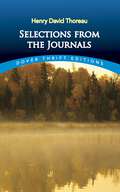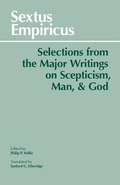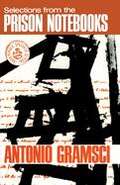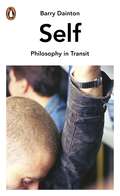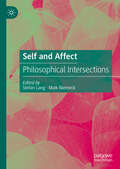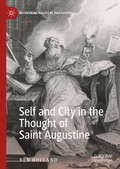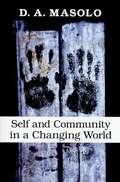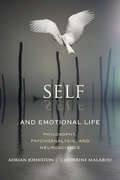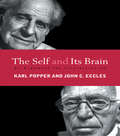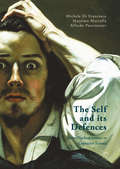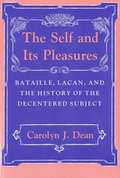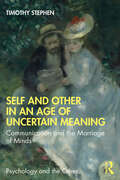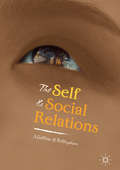- Table View
- List View
Selected Writings (World's Classics Ser.)
by Thomas AquinasIn his reflections on Christianity, Saint Thomas Aquinas forged a unique synthesis of ancient philosophy and medieval theology. Preoccupied with the relationship between faith and reason, he was influenced both by Aristotle's rational world view and by the powerful belief that wisdom and truth can ultimately only be reached through divine revelation. Thomas's writings, which contain highly influential statements of fundamental Christian doctrine, as well as observations on topics as diverse as political science, anti-Semitism and heresy, demonstrate the great range of his intellect and place him firmly among the greatest medieval philosophers.
Selected Writings
by Meister EckhartComposed during a critical time in the evolution of European intellectual life, the works of Meister Eckhart (c. 1260-1327) are some of the most powerful medieval attempts to achieve a synthesis between ancient Greek thought and the Christian faith. Writing with great rhetorical brilliance, Eckhart combines the neoplatonic concept of oneness - the idea that the ultimate principle of the universe is single and undivided - with his Christian belief in the Trinity, and considers the struggle to describe a perfect God through the imperfect medium of language. Fusing philosophy and religion with vivid originality and metaphysical passion, these works have intrigued and inspired philosophers and theologians from Hegel to Heidegger and beyond.
Selected Writings
by Philo Hans LewyThese selections illuminate Philo's crucial role in assimilating Greek philosophy to biblical religion and accommodating Jewish belief to Greek thought. Topics include the knowledge of God; the mystic way; the soul and her God; man's humility, hope, faith, and joy; vices and virtues; and Israel and the nations.
The Selected Writings of Friedrich Nietzsche
by Friedrich NietzscheCollected here in this omnibus edition are three of Nietzsche's three most important books: The Anti-Christ, Beyond Good and Evil, and Thus Spake Zarathustra, as well as The Philosophy of Friedrich Nietzsche by Henry Louis Mencken. A perfect book for new readers of Nietzsche or anyone hoping to understand his writing and philosophy more thoroughly. The Philosophy of Friedrich Nietzsche by Henry Louis Mencken was the first, and many believe the best book on the subject. Mencken was known for his attention to detail. This book is a must read for anyone who wishes to understand Nietzche and his underlying philosophy. Thus Spake Zarathustra is a masterpiece of philosophical literature, and it is here that Nietzsche uttered the famous phrase "God is dead!" This powerful book spells out Nietzsche's belief in the will to power, and serves as an introduction to his doctrine of eternal return. One of the most influential books of philosophy ever written. Nietzsche writes with style, power, and conviction. In Beyond Good and Evil, Nietzsche attacks past philosophers for their alleged lack of critical sense and their blind acceptance of the Christian premises in their consideration of morality. The work attempts to moves "beyond good and evil" in the sense of leaving behind the traditional morality which Nietzsche subjects to a destructive critique in favor of what he regards as an affirmative approach that fearlessly confronts the perspectival nature of knowledge and the perilous condition of the modern individual. Here is Friedrich Nietzsche's great masterpiece The Anti-Christ, wherein Nietzsche attacks Christianity as a blight on humanity. This classic is essential reading for anyone wishing to understand Nietzsche and his place within the history of philosophy.
Selected Writings of Jean Jaurès: On Socialism, Pacifism and Marxism (Marx, Engels, and Marxisms)
by Jean-Numa Ducange Elisa MarcobelliThis book is an anthology of the writings of Jean Jaurès, a central figure of French socialism in the period leading up to World War I, who was born in 1859 and died in 1914, a few days before the outbreak of the conflict. Jaurès is one of the most celebrated politicians in France. His writings in this anthology touch on the subjects dear to him, which are then some of the great political themes of his time. In this book are writings on war and pacifism, on colonialism and anti-colonialism, and on the central themes of socialism of the time, such as reformism and revolution. Despite Jaurès's notoriety in France, he is not well known abroad. This book, a corpus of his emblematic writings, aims, to make Jaurès known to those who do not know him outside of France.
Selected Writings of Ralph Waldo Emerson
by Ralph Waldo EmersonFrom one of the greatest figures of 19th-century America. . . This new edition offers a broad view of the author's finest work, featuring his critical essays, poems, and letters, plus a considerable amount of material from the Journals, including an entry discovered in 1964 in the Library of Congress.
Selected Writings of Thomas Paine
by Thomas Paine Richard E. RobertsRichard E. Roberts, in the Introduction of this book, explains that Thomas Paine ". . . is the first Revolutionary of them all. Before Washington whispered of independence, Thomas Paine shouted for it. . . in his pamphlet Common Sense. . . . In it, Paine demanded a declaration of independence from England; six months later, our Declaration of Independence was written and signed. Paine had a hand in its writing. Paine could fight as well as write. He joined Washington's army and on a bitter night of retreat, he wrote Crisis 1 on a drumhead by a campfire. . . . Washington had it read to his pitiful army and they turned to whip the British at Trenton. . . . He wrote another Crisis whenever he thought it necessary. He wrote letters to every important man in the country, he reported the progress of the war, he rejoiced at victory. He was the one-man propaganda bureau of the American Revolution . . . he fought battles and wrote what he saw and thought and what his comrades saw and felt. He put into printed words the things they wanted known, he was their voice and their guide. He nourished Liberty with his breath and sweat. In peace, he went to England. There he worked on his iron bridge, his most important invention. He received a patent on it from the government of George III. But Liberty was being born in France, and Paine had to go there. He defended the French Revolution as he had defended the American. He wrote The Rights of Man, an answer to Burke's verbal attacks on the idea of freedom. Paine's logic levelled, if it did not convince, the believers in the divine right of kings. Though Paine hated kings, he loved men, and when a man was no longer a king, Paine could find no enthusiasm for his decapitation. So the French terrorists imprisoned him. Paine wrote The Age of Reason, trying to free men from theocracy and superstition as he had freed them from monarchy and slavishness. . . . Paine returned to the United States on a government ship sent by his friend Jefferson. . . . He had already said that negro slavery was vicious. He wrote of systems of government, the conduct of banks, free men's ways of laying and collecting taxes. He cried for old-age benefits, he pleaded for free education for the poor, he wanted pensions for ex-soldiers. He speculated on the causes of yellow fever, he defended the freedom of the press, he poured a flood of political articles into magazines and newspapers. He died in 1809, not greatly regarded by the new generation who did not know or had forgotten that he helped forge the liberty they enjoyed. Politicians since Paine have charmed their constituents with his words and phrases, they have borrowed his ideas and used them for their own. You will find here words which are the germ of the Monroe Doctrine and others which are the seed, first of the League of Nations, and now the United Nations. Maybe in another two hundred years, we will use the rest of the ideas Paine left us. If we do, he will be happy, he was all his life a lover of Liberty."
Selected Writings of Thomas Paine
by Ian Shapiro Jane E. Calvert Thomas PaineA central figure in Western history and American political thought, Thomas Paine continues to provoke debate among politicians, activists, and scholars People of all ideological stripes are inspired by his trenchant defense of the rights and good sense of ordinary individuals, and his penetrating critiques of arbitrary power. This volume contains Paine’s explosive Common Sense in its entirety, including the oft-ignored Appendix, as well as selections from his other major writings: The American Crisis, Rights of Man, and The Age of Reason It also contains several of Paine’s shorter essays. All the documents have been transcribed directly from the originals, making this edition the most reliable one available. Essays by Ian Shapiro, Jonathan Clark, Jane Calvert, and Eileen Hunt Botting bring Paine into sharp focus, illuminating his place in the tumultuous decades surrounding the American and French Revolutions and his larger historical legacy.
Selected Writings on Aesthetics
by Johann Gottfried HerderA seminal figure in the philosophy of history, culture, and language, Johann Gottfried Herder (1744-1803) also produced some of the most important and original works in the history of aesthetic theory. A student of Kant, he spent much of his life striving to reconcile the opposing poles of Enlightenment thought represented by his early mentors. His ideas influenced Hegel, Schleiermacher, Nietzsche, Dilthey, J. S. Mill, and Goethe.This book presents most of Herder's important writings on aesthetics, including the main sections of one of his major untranslated works, Kritische Wälder (Critical Forests). These notes, essays, and treatises, the majority of which appear here in English for the first time, show this idiosyncratic thinker both deeply rooted in the controversies of his day and pointing the way to future developments in aesthetics. Chosen to reflect the extent and diversity of Herder's concerns, the texts cover such topics as the psychology and physiology of aesthetic perception, the classification of the arts, taste, Shakespeare, the classical tradition, and the relationship between art and morality.Few thinkers have reflected so sensitively and productively on the cultural, historical, anthropological, ethical, and theological dimensions of art and the creative process. With this book, the importance of aesthetics to the evolution and texture of Herder's own thought, as well as his profound contribution to that discipline, comes fully into view.
Selected Writings on Media, Propaganda, and Political Communication (New Directions in Critical Theory #80)
by Siegfried KracauerSiegfried Kracauer stands out as one of the most significant theorists and critics of the twentieth century, acclaimed for his analyses of film and popular culture. However, his writing on propaganda and politics has been overshadowed by the works of his contemporaries and colleagues associated with the Frankfurt School.This book brings together a broad selection of Kracauer’s work on media and political communication, much of it previously unavailable in English. It features writings spanning more than two decades, from studies of totalitarian propaganda written in the 1930s to wartime work on Nazi newsreels and anti-Semitism through to examinations of American and Soviet political messaging in the early Cold War period. These varied texts illuminate the interplay among politics, mass culture, and the media, and they encompass Kracauer’s core concerns: the individual and the masses, the conditions of cultural production, and the critique of modernity.The introduction and afterword explore the significance of Kracauer’s contributions to critical theory, film and media studies, and the analysis of political communication both in his era and the present day. At a time when demagoguery and bigotry loom over world politics, Kracauer’s inquiries into topics such as the widespread appeal of fascist propaganda and the relationship of new media forms and technologies to authoritarianism are strikingly relevant.
Selected Writings on Race and Difference (Stuart Hall: Selected Writings)
by Stuart HallIn Selected Writings on Race and Difference, editors Paul Gilroy and Ruth Wilson Gilmore gather more than twenty essays by Stuart Hall that highlight his extensive and groundbreaking engagement with race, representation, identity, difference, and diaspora. Spanning the whole of his career, this collection includes classic theoretical essays such as “The Whites of Their Eyes” (1981) and “Race, the Floating Signifier” (1997). It also features public lectures, political articles, and popular pieces that circulated in periodicals and newspapers, which demonstrate the breadth and depth of Hall's contribution to public discourses of race. Foregrounding how and why the analysis of race and difference should be concrete and not merely descriptive, this collection gives organizers and students of social theory ways to approach the interconnections of race with culture and consciousness, state and society, policing and freedom.
Selected Writings on Visual Arts and Culture: Detour to the Imaginary (Stuart Hall: Selected Writings)
by Stuart HallStuart Hall’s work on culture, politics, race, and media is familiar to readers throughout the world. Equally important was his decades-long commitment to visual art. As the first collection to bring together Hall’s work on the visual, this volume assembles two dozen of Hall’s essays, lectures, reviews, catalog texts, and conversations on art, film, and photography. Providing rare insights into Hall’s engagement with the “radically different” intellectual and aesthetic space of the visual imaginary, these works articulate the importance of the visual as a site of contestation at the same time as it is a space in which Black artists and filmmakers reframe questions about diaspora, identity, and globalization. Selected Writings on Visual Arts and Culture demonstrates the breadth and range of Hall’s thinking on art, film, photography, archives, and museums. In so doing, it enables us to arrive at radical and innovative ways of understanding the world.
Selections from the Journals: An Annotated Selection From The Journal Of Henry D. Thoreau (Dover Thrift Editions: Philosophy Ser.)
by Henry David Thoreau Walter HardingNoted Thoreau scholar offers rich selection of favorite excerpts from voluminous Journals. Masterly meditations on man, society, nature and many other subjects--expressed with verve and vigor in some of the most poetic prose in American literature. Perfect introduction to the great naturalist and his thought. Introduction.
Selections from the Major Writings on Scepticism, Man, and God
by Philip P. Hallie Sanford G. Etheridge Sextus Empiricus"Judicious in every respect: selection, translation and structuring of the texts, footnotes, bibliography, and index. . . . The book of choice for undergraduate courses. " --Edward M. Galligan, University of North Carolina
Selections from the Prison Notebooks of Antonio Gramsci
by Antonio Gramsci Quintin Hoare Geoffrey Nowell SmithAn extensive anthology, including his most important writings while in prison on philosophy, history, Communist Party formation, the intellectuals, and other subjects.
Self: Philosophy In Transit (Philosophy in Transit)
by Barry DaintonIn the third in a new series of short, provoking books of original philosophy, acclaimed thinker Barry Dainton takes us through the nature of SelfWhen you think 'What am I?', what's actually doing the thinking? Is it a soul, or some other kind of mental entity separate from your body, or are 'you' just a collection of nerve-endings and narratives? In the third in a new series of short, provoking books of original philosophy, acclaimed thinker Barry Dainton takes us through the nature of Self and its relation to the rest of reality. Starting his journey with Descartes' claim that we are non-physical beings (even if it seems otherwise), and Locke's view that a person is self-conscious matter (though not necessarily in human form), Dainton explores how today's rapid movement of people, and information affects our understanding of self. When technology re-configures our minds, will it remake us, or kill us? If teleportation becomes possible, would it be rational to use it? Could we achieve immortality by uploading ourselves into virtual worlds? Far-reaching and witty, Self is a spirited exploration of the idea that in a constantly-changing world, we and our bodies can go their separate ways.
Self and Affect: Philosophical Intersections
by Stefan Lang Maik NiemeckThe self, self-awareness and emotions are central subjects within contemporary philosophy of mind but comparatively little attention has been paid to the relationships between them. This volume brings together philosophers from different specialisms to explore these relationships from three different angles. First, whether a theory of self-awareness can contribute to a theory of emotion, including how different aspects and kinds of self-awareness are related to different emotions. Second, from the opposite direction, whether research into emotions can help achieve a better understanding of self-consciousness. Finally, the book considers how emotions are involved in the nature and development of selves. Self and Affect is essential reading for all scholars and researchers of the philosophy of mind, especially those focussing on emotions and self-awareness.
Self and City in the Thought of Saint Augustine (Recovering Political Philosophy)
by Ben HollandSelf and City in the Thought of Saint Augustine explores the analogy between the self and political society in the thought of St. Augustine of Hippo. This analogy is an important theme in the history of political thought. Attempts have been made to understand the state by examining the soul (since Plato), the body (as in medieval theories of the body politic) and the person (surviving to this day in such concepts as international legal personality). This book aims to reinstate the Augustinian part of the story. It argues that Augustine develops three analogies between self and city, as a society ordered by love: self-love in the case of the Earthly City; divided but improving love in the Pilgrim City; and love of others and of God in the City of God. It supplies thereby an overview of Augustine’s intellectual ‘system’ as it touches upon theology, psychology and anthropology, as well as politics, and also provides a new interpretation of Augustine’s important definition of the republic.
Self and Community in a Changing World
by D. A. MasoloRevisiting the classic questions of African philosophy, Masolo reframes indigenous knowledge as diversity & moves to a consideration of the vexed question of human rights abuses. He offers solutions for the containment of socially destructive conduct and antisocial tendencies through the engagement of community.
Self and Emotional Life: Philosophy, Psychoanalysis, and Neuroscience (Insurrections: Critical Studies in Religion, Politics, and Culture)
by Adrian Johnston Catherine MalabouAdrian Johnston and Catherine Malabou defy theoretical humanities' deeply-entrenched resistance to engagements with the life sciences. Rather than treat biology and its branches as hopelessly reductive and politically suspect, they view recent advances in neurobiology and its adjacent scientific fields as providing crucial catalysts to a radical rethinking of subjectivity.Merging three distinct disciplines—European philosophy from Descartes to the present, Freudian-Lacanian psychoanalysis, and affective neuroscience—Johnston and Malabou triangulate the emotional life of affective subjects as conceptualized in philosophy and psychoanalysis with neuroscience. Their experiments yield different outcomes. Johnston finds psychoanalysis and neurobiology have the potential to enrich each other, though affective neuroscience demands a reconsideration of whether affects can be unconscious. Investigating this vexed issue has profound implications for theoretical and practical analysis, as well as philosophical understandings of the emotions.Malabou believes scientific explorations of the brain seriously problematize established notions of affective subjectivity in Continental philosophy and Freudian-Lacanian analysis. She confronts philosophy and psychoanalysis with something neither field has seriously considered: the concept of wonder and the cold, disturbing visage of those who have been affected by disease or injury, such that they are no longer affected emotionally. At stake in this exchange are some of philosophy's most important claims concerning the relationship between the subjective mind and the objective body, the structures and dynamics of the unconscious dimensions of mental life, the role emotion plays in making us human, and the functional differences between philosophy and science.
The Self and Its Brain: An Argument for Interactionism
by John C. Eccles Karl PopperThe relation between body and mind is one of the oldest riddles that has puzzled mankind. That material and mental events may interact is accepted even by the law: our mental capacity to concentrate on the task can be seriously reduced by drugs. Physical and chemical processes may act upon the mind; and when we are writing a difficult letter, our mind acts upon our body and, through a chain of physical events, upon the mind of the recipient of the letter. This is what the authors of this book call the 'interaction of mental and physical events'. We know very little about this interaction; and according to recent philosophical fashions this is explained by the alleged fact that we have brains but no thoughts. The authors of this book stress that they cannot solve the body mind problem; but they hope that they have been able to shed new light on it. Eccles especially with his theory that the brain is a detector and amplifier; a theory that has given rise to important new developments, including new and exciting experiments; and Popper with his highly controversial theory of 'World 3'. They show that certain fashionable solutions which have been offered fail to understand the seriousness of the problems of the emergence of life, or consciousness and of the creativity of our minds.In Part I, Popper discusses the philosophical issue between dualist or even pluralist interaction on the one side, and materialism and parallelism on the other. There is also a historical review of these issues.In Part II, Eccles examines the mind from the neurological standpoint: the structure of the brain and its functional performance under normal as well as abnormal circumstances. The result is a radical and intriguing hypothesis on the interaction between mental events and detailed neurological occurrences in the cerebral cortex.Part III, based on twelve recorded conversations, reflects the exciting exchange between the authors as they attempt to come to terms with their opinions.
The Self and its Defenses: From Psychodynamics to Cognitive Science
by Massimo Marraffa Michele Di Francesco Alfredo PaternosterThis book presents a theory of the self whose core principle is that the consciousness of the self is a process of self-representing that runs throughout our life. This process aims primarily at defending the self-conscious subject against the threat of its metaphysical inconsistence. In other words, the self is essentially a repertoire of psychological manoeuvres whose outcome is self-representation aimed at coping with the fundamental fragility of the human subject. This picture of the self differs from both the idealist and the eliminative approaches widely represented in contemporary discussion. Against the idealist approach, this book contends that rather than the self being primitive and logically prior, it is the result of a process of construction that originates in subpersonal unconscious processes. On the other hand, it also rejects the anti-realistic, eliminative argument that, from the non-primary, derivative nature of the self, infers its status as an illusory by-product of real neurobiological events, devoid of any explanatory role.
The Self and Its Pleasures: Bataille, Lacan, and the History of the Decentered Subject
by Carolyn J. DeanWhy did France spawn the radical poststructuralist rejection of the humanist concept of ‘man’ as a rational, knowing subject? In this innovative cultural history, Carolyn J. Dean sheds light on the origins of poststructuralist thought, paying particular attention to the reinterpretation of the self by Jacques Lacan, Georges Bataille, and other French thinkers. Arguing that the widely shared belief that the boundaries between self and other had disappeared during the Great War helps explain the genesis of the new concept of the self, Dean examines an array of evidence from medical texts and literary works alike. The Self and Its Pleasures offers a pathbreaking understanding of the boundaries between theory and history.
Self and Other in an Age of Uncertain Meaning: Communication and the Marriage of Minds (Psychology and the Other)
by Timothy StephenSelf and Other in an Age of Uncertain Meaning explores the nature and origins of widespread problems of self in modern societies. It examines the paradoxical interplay between the modern world's many benefits and freedoms, and its mounting social challenges and psycho-emotional impacts. Over time the character of consciousness has shifted in concert with societal trends. The experienced world has become more nuanced, fragmented, and uncertain, as well as increasingly personal and intimate, reshaping social relationships. Chapters analyze the interdependence of language, mind, intimacy, the self, and culture, arguing that as the coevolution of these five factors produced the modern world, many features of contemporary culture have become disruptive to security of being. The book explores the importance to the vital sense of self in constructing relationships based in mutual recognition of moral and intellectual equality between partners.Rich with examples from everyday experience, this text offers profound insights for those interested in sociology, psychoanalysis, psychology, communication, history, and culture.
The Self and Social Relations
by Matthew WhittinghamThis book is concerned with the human individual and her relationship with the communities of which she is a member. It argues against the traditional atomistic view that individuals are essentially independent of the social relations into which they enter, and instead argues for the holistic view that we are essentially social beings who cannot exist apart from normative communities. Matthew Whittingham engages in a sustained exploration and criticism of the classic Western picture of epistemology. He argues instead that communities ground the possibility of our forming a conception of the world and ourselves, that those social relations open up a range of affective responses and forms of action that would otherwise be impossible, they enable us to know and reason about the world, and they make possible the daily struggles for freedom and self-realization that are familiar to us all and find their most powerful expression in major social movements.
